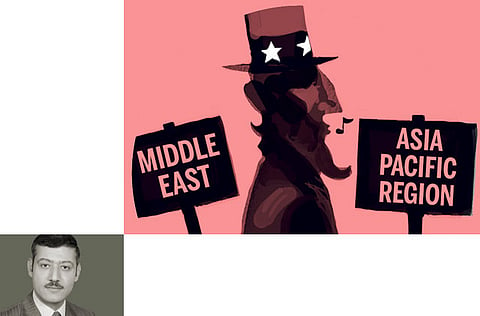Adapting to US foreign policy changes
Washington has retreated from the Middle East and the Gulf to invest more in checking China's rising influence

At a time when the entire Arab world is completely absorbed with developments in Syria and the Gulf region, following Iran’s threats to close the Strait of Hormuz, the Barack Obama administration’s eye is focused further east. Those who expect Washington to act swiftly to stop the bloodshed in Syria or take a tougher stand on Iranian provocations might therefore not see what they wish for accomplished any time soon. The Obama administration does not seem very enthusiastic to take what some portray as an opportunity to cut back the Iran-led axis in the region.
In fact, except for heeding elections promises; such as withdrawing US forces from Iraq and focus more on Afghanistan as a step towards retreat, alongside scant attempts to repair relations with the Islamic world, badly damaged under his predecessor and half-hearted efforts to bring about a conclusion to the Israeli-Palestinian conflict, until recently the Obama administration lacked any coherent foreign policy doctrine. For three complete years, Obama adopted a defensive foreign policy with the aim of stopping the erosion of US power; political, economic, and moral. Last month, however, the Obama administration decided to end this phase, which has largely been characterised by lack of clarity. The Middle East does not occupy a central place in the newly-defined foreign policy vision, dubbed as “the Obama Doctrine”. “The future of politics will be decided in Asia, not Afghanistan or Iraq, and the US will be right at the centre of the action”, Hillary Clinton, US Secretary of State, which has been entrusted with defining the new US foreign policy strategy, wrote in Foreign Policy magazine last November. “In the next 10 years, we need to be smart and systematic about where we invest time and energy, so that we put ourselves in the best position to sustain our leadership, secure our interests, and advance our values. One of the most important tasks of American statecraft over the next decade will therefore be to lock in a substantially increased investment — diplomatic, economic, strategic, and otherwise — in the Asia-Pacific region”, Clinton explained.
China, which is increasingly becoming the US No 1 global challenge, has been set as the target for the new strategy. Iran’s provocations in this context is seen as a little more than a thorn that can only hurt in as much as it contributes to Chinese power. The Obama administration believes hence that its predecessor’s major mistake was taking the US eye off the ball by fighting the wrong war in Iraq and thus strengthening Iran’s regional standing. It should have instead kept the focus on Afghanistan to prevent a geographic connection that could facilitate the flow of Iranian oil to China.
Over the past decade, China has transformed from being a regional power, where its main concerns are to defend its borders in a largely inhospitable environment, to a global power with interests extending throughout the world particularly in pursuit for energy supplies. The quest for oil has taken Beijing as far afield as North Africa and Latin America. Oil demands are increasingly defining China’s attitudes toward US policies from Eurasia to the Middle East to North and West Africa. Concerns over oil security are influencing China’s diplomatic and strategic calculations putting it in a collision course with the US.
In fact, just as the US exerts hegemony over the Western Hemisphere, China’s hegemony is being seen over much of the Eastern Hemisphere. That must be a worrying development for Washington. At the end of Second World War, all of the key powers in the region; including China, Japan, and Korea were devastated. The US Navy owned the Western Pacific as though it were an imperial lake. Those days are gone. This is exactly what forced Washington to shift its attention from the Atlantic and relations with the troubled EU to the Pacific Ocean. It is also the key motive which made Washington retreat from the Middle East and the Gulf region to invest more in checking China’s rising influence.
Since the US completed its withdrawal from Iraq, it has become apparent that Washington’s appetite to confront Iran’s regional influence is dwindling. The Arab Gulf states must have hence realised that the Obama administration’s commitment to their security is no longer guaranteed. From now on, the GCC countries must rely on their own power to ward off Iranian interference and provocations. They must heed the call made by Saudi King Abdullah Bin Abdul Aziz during the latest GCC summit in Riyadh to move from co-operation to unity in order to face the mounting threats for their security. The Syrian opposition must also stop their quarrel over foreign intervention because foreign intervention will not come. They must rely on and trust the Syrian people to bring about the desired change. America’s eye is focused somewhere else.
Dr Marwan Kabalan is the Dean of the Faculty of International Relations and Diplomacy at the University of Kalamoon, Damascus, Syria.
Sign up for the Daily Briefing
Get the latest news and updates straight to your inbox


